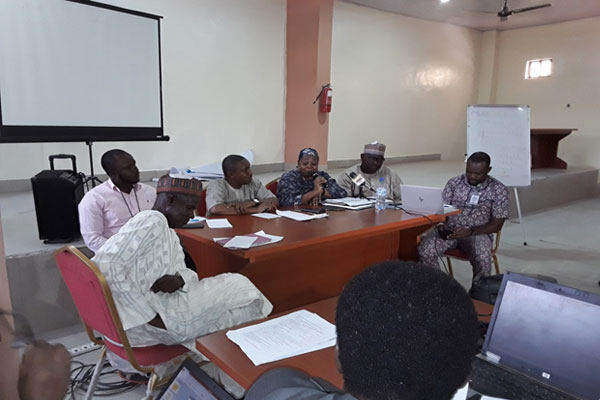Alone’s Maiduguri Dialogue Repositions Civic Constituencies for Rehabilitation, Reconstruction and Resettlement in Northeast Nigeria
As part of the series of activities to promote civil society engagement of the humanitarian crisis in the northeast of Nigeria, Social Action on 2nd of April 2019, organised a dialogue with the theme, “Repositioning Civic Constituencies for Rehabilitation, Reconstruction and Resettlement in the Northeast” in Maiduguri, Borno State. The event served as a platform for civil society actors, academics and government officials to discuss the proposed federal government plan for rehabilitating the conflict-ravaged northeast, and to identify opportunities for collaboration towards addressing immediate and longer-term needs in the area. In particular, the dialogue examined CSOs readiness to engage and monitor the implementation of the plan.
While welcoming participants to the dialogue, Social Action’s Programme Officer, Isaac Botti supported the federal government’s intention to move interventions from immediate humanitarian needs to concrete sustainable development projects capable of facilitating rehabilitation and resettlement of victims of a decade of conflicts. However, beyond supporting the good intentions of the government, Botti emphasised the need for civic constituencies to interrogate the plan and to identify how to engage with the government to ensure success.
A paper presentation by Professor Abubarka Mua’zu, the Executive Director of Borno Coalition for Democrat and Progress (BOCODEP) on “Rehabilitation and Reconstruction Agenda: Prospects and Challenges” delivered by Dr. Nuhu Gapsiso examines the component and content of the Buhari Plan as well as distilled some of the challenges that may be encountered in the course of implementation. He noted that the process of reconstruction involves partial or total relocation and rebuilding the essential physical infrastructures and shelter. He pointed out that rebuilding of housing and community infrastructure should form the early point of the rehabilitation process. He further stated that the process of rehabilitation should involve building people’s capacity to sustain life by improving their livelihood means, including developing the role of women and allowing for inclusive participation.
In his keynote address on “After the General Elections: X-raying the Rehabilitation and Reconstruction Agenda”, Professor Ibrahim Umara of the University of Maiduguri emphasised the need to ensure the effectiveness of the rehabilitation and reconstruction process. He proposed a vertical and horizontal implementation model. The vertical model ensures the inflow of resources from government and donors toward a people-oriented implementation structure. The horizontal model helps to provide context-based issues by contributing to decision making and also assessing the performance of its members. He describes the two models of reconstruction to covering (1) Reconstruction of the Lake Chad (2), aforestation to protect the environment from desert encroachment and, (3) promoting social cohesion.
 Speaking on social cohesion, the Director of Humanitarian Relief Borno State Emergency Management Agency, Mr Ali Isa Yaisa emphasised the need for CSOs to liaise with State Emergency Management Agency and National Emergency Management Agency, NGOs and INGOs for adequate coverage and monitoring of intervention programmes.
Speaking on social cohesion, the Director of Humanitarian Relief Borno State Emergency Management Agency, Mr Ali Isa Yaisa emphasised the need for CSOs to liaise with State Emergency Management Agency and National Emergency Management Agency, NGOs and INGOs for adequate coverage and monitoring of intervention programmes.
During the panel session which focused on what rehabilitation agenda should look like, the Executive Chairman of Borno State Emergency Management Agency, Dr. Yabawa Kolo noted that rehabilitation agenda should focus on building the communities and also empower SEMA to generate needed data on displaced and affected persons to be resettled taking into account lost and destroyed properties. She also called for a comprehensive Need Assessment to ensure that the needs of the masses are prioritized during the reconstruction implementation process.
Ambassador Shehu Ahmed of the Network of Civil Society InBorno (NECSOB) described the role of civil society in the rehabilitation process as complementary to the government in fostering accountability.
A civil society representative, Comrade Edem Edem of the Green Concern for Development, and representative of NEMA, Mr Tijjani Hassan noted the need for a comprehensive civil society agenda that will be mainstreamed into the rehabilitation implementation process.
Participants at the Dialogue agreed that for effective implementation of any rehabilitation plan for northeast Nigeria, there is a need to strengthen badly damaged community structures, including the role of women and youths. Strengthened community leadership is needed to ensure full stakeholder participation and programme integration. Participants also agreed on the need for a serious consultation with other members of the civil society to ensure effective coordination of efforts.
Finally, the meeting emphasised the need to take the discussion to the national platform where national, international actors – including state and non-state actors – will have the opportunity set critical agenda that will feed into the rehabilitation plan.
